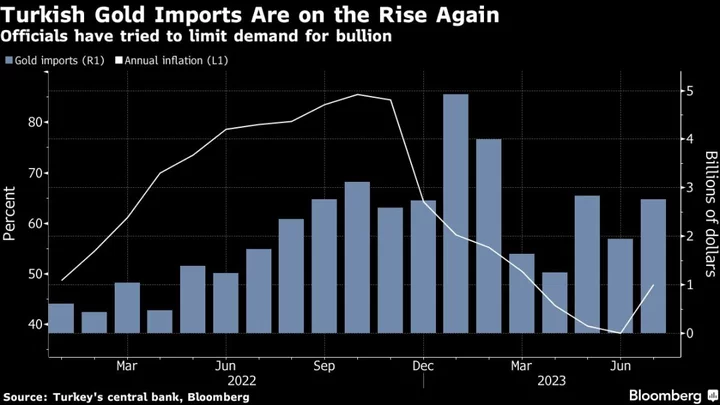Turkey’s current account swung back to a wider deficit than forecast in July after a rare surplus the previous month, as surging gold imports added to a deteriorating trade gap.
The shortfall was $5.5 billion, compared with a revised surplus of $651 million in June and a deficit of $3.5 billion in July 2022, according to central bank data published on Monday. The median estimate in a Bloomberg survey of analysts was for a gap of $4.5 billion in July.
The lira traded little changed after the data release, although with a decline of 0.1% against the dollar on the day it was among the worst performers in major emerging markets as of 1:44 p.m. in Istanbul. The Turkish currency has lost about a third of its value so far in 2023, the biggest loss among global peers after Argentina.
A chronic imbalance in trade is a key vulnerability for the $900 billion economy that authorities want to overcome by reducing Turkey’s dependence on imports. Fresh economic targets unveiled by the government last week project the current-account deficit narrowing from about 4% of gross domestic product this year to 3.1% in 2024.
Since President Recep Tayyip Erdogan installed a new team to manage the economy after reelection in May, the goal has been to stabilize Turkey’s external finances by cooling off domestic demand with more orthodox measures such as higher interest rates and restrictions on gold imports.
The central bank has almost tripled its key interest rate to 25% since June, while the government announced a more realistic macroeconomic program that committed to reducing inflation and building back reserves.
Treasury and Finance Minister Mehmet Simsek on Monday said one of the new economic team’s priorities is to curb credit expansion, with a special emphasis on restrictive measures for vehicle and some housing loans.
“If needed, we will head to quantitative tightening,” he told private broadcaster NTV. “We need to control the current-account deficit.”
Erdogan has said monetary tightening would be used to rein in high inflation, which the government sees finishing the year at 65%. The president’s comments mark a break with his earlier advocacy of cheap money at the expense of price stability.
But a lasting improvement isn’t yet in sight for the current account, especially as demand for Turkish exports is sluggish and gold remains popular as a hedge against currency debasement. The trade shortfall in July was $10.5 billion, widened from a shortfall of $3.8 billion the previous month.
Simsek highlighted efforts to boost financing for exports, which he said could help limit the gap in the current account.
Fitch Ratings, which raised Turkey’s credit outlook to stable from negative on Friday, said the current-account deficit “will remain high” this year and reach 4.7% of GDP. It listed “increased” balance-of-payments pressures among “ratings sensitivities.”
A major factor behind the deterioration from June was wage hikes that drove up Turkey’s imports, according to a report from Goldman Sachs Group Inc. It also said that “a month of relative FX stability” meant purchases of foreign goods may have been “brought forward in expectations of future currency weakness.”
--With assistance from Joel Rinneby and Firat Kozok.
(Updates with lira in third paragraph, Simsek’s comments starting in seventh.)









